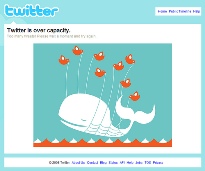I went to email this to a friend of mine and realized that there was probably a better means of putting this thought out to him through Facebook. Except Facebook is either down (earlier today they told me my account was inaccessible because they were doing update work on the servers) or is no longer accessible behind the work firewall.
WHATEVER – though there is probably something to be learned from that experience. I’ll let you draw your own conclusions. What happens when the services we depend upon are not accessible to us? Those who are active tweeters who have experienced the fail whale on many occasions know exactly that of which I speak.
With that said, here’s the main thrust of this post. Hat tip to John Gruber for bringing Matt’s rant to my attention.
Maybe you’ve already seen Matt Haughey’s [founder of MetaFilter] rant on “How Social Media Really Works” on his personal website. If not, it’s worth a read.
Make sure you read through the entire set of comments. Basically his argument breaks down to: I research products by asking the people I trust and their opinion is really what matters most to me. In the end, I want to buy the best products available so my suggestion to the marketers out there is build an excellent product and the voice of the masses will discover your excellence. Gaming the system will gain you nothing if your product sucks.
In my mind there is strong value to his argument. As the Cluetrain Manifesto once upon a time declared, markets are conversations. Any attempt to game those conversations will eventually come back to bite the author / sponsoring company in the ass. If you become a part of the conversation and realize that in today’s market, your brand is largely no longer controlled by you, then you have an opportunity to first hear, then learn from, and if you’re really good, educate your community.
A brand manager’s responsibility in this new era is to foster and cultivate their community by developing products and experiences that offer answers to the jobs their customers have that need to be done. It means do an awful lot more listening and a lot less talking.


You know, an interesting blog post would be “A Code of Ethics for Brand Manager about Conversations”. For many products, customers are the “awkward teenagers” at the party, who don’t want to start a conversation. A Brand Manager should have some responsibility to start a conversation…but you’re right, how can you start it with out appearing to game the system?
Is it creating a discussion around the problems that your product can solve? Is that ethical/good business?
Ben, you know, I’m actually in the midst of sifting through two posts that I plan to publish in the next few days discussing: 1) How the big brands like P&G and Kraft are struggling with this question about how to engage. I mean, it makes perfect sense for Dell to open up their site and say, “Come talk to us.” because they have a large technically adept following and passionate customers at that. But what does anyone want to say about a 99 cent blue box of Kraft Mac & Cheese? Or how about Tide liquid detergent of all things? It seems like with Nutella, the most successful communities are organic – the question is how do you seed the community and foster its growth? It probably requires an examination of what types of products and services warrant a community engagement.
The other post I’m sifting through is 2) Whether all of this “engagement” actually has real benefit for a brand. Skittle turned their website into a socially focused site where users drive the message. Is this actually driving better results to the bottom line? Some would say this is like advertising – you make the media spend because that’s part of keeping your brand in people’s minds. Others would say it’s all about cementing your relationship with consumers and getting to understand their underlying needs. REALLY? I just don’t know that every Brand Manager can realistically anticipate this being the truth.